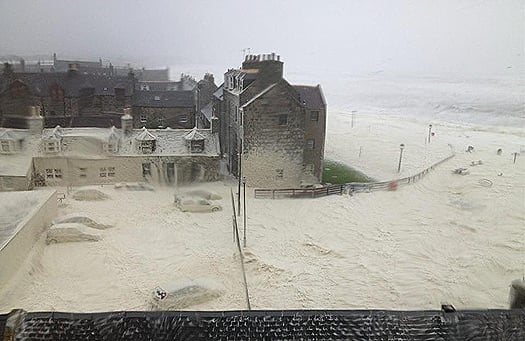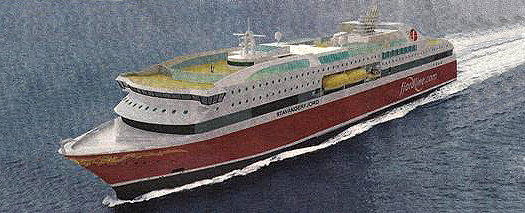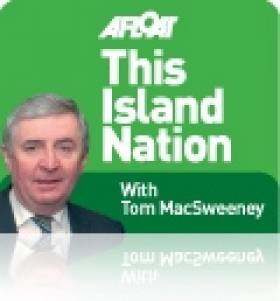Displaying items by tag: Liaoning
Lifeboat Design, Foam in Aberdeen, and International Maritime Stories
KEEPING A LIFEBOAT UNDER WRAPS
Keeping a lifeboat design under wraps is some achievement, but that's what an Irishman did with the design for the first RNLI lifeboat to be named after an Irish river. In fact, at the age of 24 he designed the hull form in his spare time!
Four years after his original design, the Shannon class was introduced to public view this week at RNLI headquarters.
Peter Eyre, from Derry, could take justifiable pride because he is an RNLI Naval Architect.
'I kept the design under wraps in the early stages. After a while my boss could see I was working on something and encouraged me to continue. My job was to find the design by working with other naval architects, not to design it. I was the youngest in the team and before long I had designed the new lifeboat hull.
I'm chuffed it was named after an Irish river and the strong connection the boat now has with Ireland. I think the moment it first goes out on a service will be the high point of my career. It's a great legacy to be a part of. When the first life is saved I think that's when it will really hit home.'
Peter has a strong commitment to the RNLI, ever since he was just 14-years-old and the family's 30ft. cruiser racer yacht was dismasted in rough seas and Force 7 winds.
"We were escorted back to shore by the volunteer lifeboat crew. We were so relieved," he recalls.
This is the first time that the RNLI has named a class of lifeboat after an Irish rive.
"It is very fitting considering that Peter has been so fundamental in its design," said Owen Medland, RNLI Training Divisional Inspector for Ireland. "All of the crews who have tested the new lifeboat have been thrilled with its speed, manoeuvrability and the improved crew safety features. We don't know yet which Irish lifeboat stations will receive a Shannon class lifeboat, but the Shannon is designed to replace the majority of Mersey and some Tyne class lifeboats. We look forward to seeing the Shannon here in the near future.'
UK stations will be the first to get the new boat for which the RNLI has launched a €6m. fundraising campaign across the UK and Ireland.
• To make a donation visit: www.rnli.org/newlifeboatappeal
NEW FACE OF ABERDEEN

The amount of foam which swept into Aberdeen in Scotland from the gales that hit the UK and caused a lot of flooding during the week was astonishing.
As the photograph here shows, it looks like the area close to the seashore was covered in snow.
Capt.Rowan MacSweeney, my son, is serving on offshore oil rig supply work at present and told me:
"Monday night was a lively night about these parts. We were 4.5nm out from Aberdeen breakwaters because the port closed. Top gust on our anenometer 70 knots and we got swells of 13metres in the bay. Check out the photo one of the lads I know from another boat took the morning after of the foam created by the storm. Pretty unusual."
Indeed it is.
RULING ENDS 'DARK AGES'
{youtube}MbjC9SMKClE{/youtube}
The tanker Exxon Valdez which became notorious after spilling 750,000 barrels of oil into Prince William Sound in Alaska on March 24, 1989, is to be broken-up on Alang Beach in India following assurances given to India's highest court that it would not contain hazardous substances. This was needed after the Court made a ruling which environmentalists have hailed as ending the 'dark ages' of breaking up ships containing hazardous materials on beaches. There have been increasing protests about this practice because of the health, safety and environmental risks involved, particularly for low-paid workers without protection equipment. The Court ruled that vessels sent for shipbreaking will be subject to international rules based on the Basel Convention about hazardous wastes, meaning that shipowners will in future have to remove these materials before the ships are approved for breaking-up on Indian beaches.
FIRST NORWEGIAN CRUISE

The first cruise direct from Cork to Norway has been announced. Lee Travel and Royal Caribbean International will run two 12-day cruises on June 3 and September 9 next year aboard the Independence of the Seas departing from Cork Port's cruise terminal at Cobh. There will be a capacity for 200 passengers to join in Cork Harbour, according to Lee Travel with prices from €1,699 per person, based on 2 adults sharing an inside stateroom. Fly/Cruise price includes flights back to Dublin/Cork. The Norwegian cruises will take in fjords, glacial inlets, castles, the Norwegian countryside and Oslo.
Declan O Connell, Managing Director of Lee Travel, said there is a demand for such a service from Cork. "We are confident that these cruises will be popular and that Royal Caribbean will sail more ships out of Cobh for many years to come."
GAS FERRIES
Norway is also to the fore in another cruise ship development. The first cruise ferries in the world to be powered by natural gas are under construction in a Bergen shipyard for the Norwegian shipping company, Fjord Line. They will be 170-metres long, powered by Rolls Royce LNG-based engines. The company says they will be the most environmentally-friendly cruise ships on the seas, the first to begin sailing next May out of Bergen in Norway and the second a few months later.
WORK-RELATED DROWNINGS
The Irish Water Safety Association has recorded 22 work-related drownings in the Republic in the past five years of which 17 were in fishing, 1 while transporting freight over water, 1 each in quarrying and construction and 2 in agriculture. The figures were released this week, coinciding with the National Ploughing Championships and following the tragic Northern Ireland drownings in the farm slurry tank, as a reminder that safety is needed at all times. The Association has also pointed out that children are naturally curious about water: "Each year too many young children are involved in preventable aquatic accidents - forty children have drowned in the last ten years."
FIRST MAN TO WALK ON THE MOON BURIED AT SEA
The first man to walk on the moon has been buried at sea. NASA said Neil Armstrong's cremated remains were buried in the Atlantic Ocean during a ceremony aboard the USS Philippine Sea. The space agency didn't give the location of the ceremony. The ship's homeport is Mayport, Florida. Neil
Armstrong was a Navy fighter pilot before joining the space programme. He died in Ohio in August at the age of 82. His burial followed at sea followed a memorial service in Washington.
RUSSIAN SPECIAL
The Russian Navy is to build a new type of search-and-rescue ship which will be launched in 2014. It will have submersible rescue vessels aboard. This is because of the number of Russian submarines which have got into difficulties in past years.
CHINESE FIRST
China's first aircraft carrier has entered service. The 300m (990ft) Liaoning - named after the province where it was refitted - is a refurbished Soviet ship purchased from Ukraine. the carrier has no operational aircraft and will be used for training. The Chinese Government said the vessel, which has undergone extensive sea trials, will increase its capacity to defend State interests.
TANKER DESTROYED COMMANDER
The Commander of a U.S. Navy destroyer was removed from command after his vessel was involved in a collision. The USS Porter was operating near the Straits of Hormuz when struck on its starboard side by the 300,000-tonne tanker Otowasan. Nobody was hurt in the incident .The tanker suffered only superficial damage, but the destroyer was severely damaged according to reports and sailed to the United Arab Emirates for repairs. The destroyer's Commander, Martin Arriola, was removed from command there and replaced.
MAIDEN GROUNDING
A cargo ship has ran aground on its maiden voyage from Southampton to the Channel Islands. The 295ft. £8.8m Huelin Renouf Dispatch hit an isolated rock one and a half miles south-west of Alderney and issued a distress cal, responded to by the RNLI Roy Barker One which was on the scene within 15 minutes. Damage to the Dispatch was assessed and it was found that water was coming in at the stern. The vessel had a crew of eight. The leak was contained and the 2,500-ton ship was floated off the rock then sailed to Falmouth at half-speed where it went into dry dock.
Email your comments on maritime matters to : [email protected]
Follow Tom for more maritime news and comment on Twitter: @TomMacSweeney
And on Facebook – http://www.facebook.com/THISISLANDNATION





























































